小升初英语专题讲解八代词2
- 格式:doc
- 大小:285.00 KB
- 文档页数:15
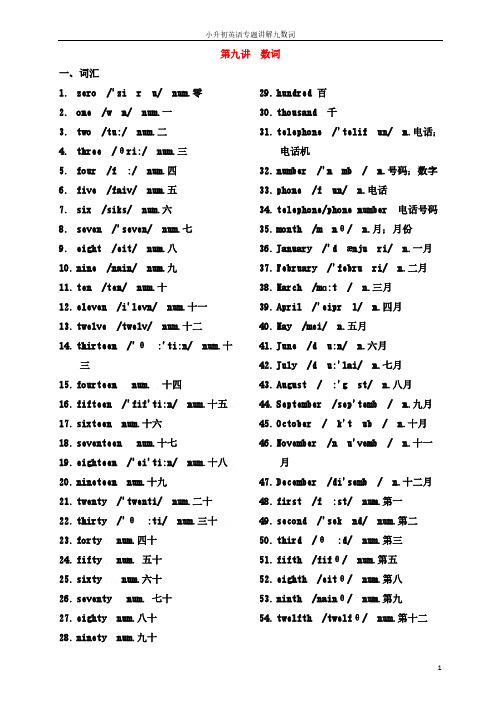
第九讲数词一、词汇1.zero /'ziɔrɔu/ num.零2.one /wɔn/ num.一3.two /tu:/ num.二4.three /θri:/ num.三5.four /fɔ:/ num.四6.five /faiv/ num.五7.six /siks/ num.六8.seven /'seven/ num.七9.eight /eit/ num.八10.nine /nain/ num.九11.ten /ten/ num.十12.eleven /i'levn/ num.十一13.twelve /twelv/ num.十二14.thirteen /'θɔ:'ti:n/ num.十三15.fourteen num. 十四16.fifteen /'fif'ti:n/ num.十五17.sixteen num.十六18.seventeen num.十七19.eighteen /'ei'ti:n/ num.十八20.nineteen num.十九21.twenty /'twenti/ num.二十22.thirty /'θɔ:ti/ num.三十23.forty num.四十24.fifty num. 五十25.sixty num.六十26.seventy num. 七十27.eighty num.八十28.ninety num.九十29.hundred 百30.thousand 千31.telephone /'telifɔun/ n.电话;电话机32.number /'nɔmbɔ/ n.号码;数字33.phone /fɔun/ n.电话34.telephone/phone number 电话号码35.month /mɔnθ/ n.月;月份36.January /'dɔænjuɔri/ n.一月37.February /'februɔri/ n.二月38.March /mɑ:tɔ/ n.三月39.April /'eiprɔl/ n.四月40.May /mei/ n.五月41.June /dɔu:n/ n.六月42.July /dɔu:'lai/ n.七月43.August /ɔ:'gɔst/ n.八月44.September /sep'tembɔ/ n.九月45.October /ɔk'tɔubɔ/ n.十月46.November /nɔu'vembɔ/ n.十一月47.December /di'sembɔ/ n.十二月48.first /fɔ:st/ num.第一49.second /'sekɔnd/ num.第二50.third /θɔ:d/ num.第三51.fifth /fifθ/ num.第五52.eighth /eitθ/ num.第八53.ninth /nainθ/ num.第九54.twelfth /twelfθ/ num.第十二55.twentieth /'twentiiθ/ num.第二十二、重点短语集锦1.first name n.名字2.hundreds of成百上千的3.thousands of成千上万的4.get up起床5.go to school去上学6.get dressed穿衣服7.brush teeth 刷牙8.eat breakfast/lunch/dinner 吃早、午、晚饭9.take a shower 洗澡10.do homework做作业11.clean your room 打扫房间12.take a walk 散步13.go to bed 睡觉14.go home 回家15.play sports 参加体育运动16. eat vegetables 吃蔬菜17. eat ice-cream吃冰激淋三、知识讲解1、基数词表示数目多少的词叫基数词1)基数词的构成:1-12是独立的单词,13-19以teen结尾,13,15,18拼写特殊,其余在3-9个位数的基础上加-teen20-90十位的整数以-ty结尾,30,40,40,80的拼写较为特殊hundred,thousand与数字连用时用作单数形式,与of连用时要用复数形式,但前面不能加数字。

小升初英语专题复习(语法专练):代词一、单选题(共50题)e here, please. I'll tell you _______.A. anything importantB. important anythingC. something importantD. important something2.I want to buy _____ .A. anything to eatB. something to eatC. something eat3.Can I speak to _______?A. theyB. sheC. heD. her4.You taught _________ Chinese.A. IB. meC. my5.—Let _______ help _______.—Thank you.A. us; youB. we; youC. us; your6.We should do _______ carefully.A. anythingB. somethingC. everything7.A: How much _______ the orange juice?B: Oh, _______ 8 yuan.A. is; it isB. are; they areC. are; it isD. is; this is8._________ducks are very naughty.A. ThisB. TheseC. That9.Put ________ in my purse.A. heB. himC. his10.Is that ______guitar?A. youB. yourC. yours11.Helen Keller helped blind people ________.A. everyoneB. everythingC. everywhere12.—Lingling, tomorrow is your birthday. My mum is making a cake for ________.—Thank you!A. herB. sheC. you13.These bags are very heavy. I can't carry ________.A. theseB. themC. it14.Miss Liu taught ________ English on Sundays.A. ourB. weC. us15.—Who gave ________ to you?—It's Lily.A. itB. itsC. it's16.Everyone says hello to ________.A. IB. meC. my17.My dress is cheaper than dress.A. sheB. hersC. her18.My legs are longer than .A. youB. yoursC. your19.Do it by _______.20.My parents were not at home yesterday, so I have to cook for _____.A. yourselfB. himselfC. myself21.It will be the first time for ______.A. heB. hisC. him22.Can you tell me ______ about your work?A. some thingB. some thingsC. something23.— Who is_______?—_______is Joe speaking.A. this; ThatB. that; ThisC. that; That24.Do you often tidy ________ bed?A. youB. IC. your25.Please give me ________ T-shirt. This one is too small.A. otherB. anotherC. the other26.________ stamps are from the US.A. ThisB. TheseC. That27.Follow _____________, please!A. meB. IC. my28.Please help ____________ to the food.A. yourselvesB. yourC. you29.Are __________ your socks?A. thisB. thoseC. that30.This schoolbag is __________.A. mineB. myC. me31.We didn't buy ________ there.A. somethingB. anythingC. everything32.Li Shan cooked breakfast by______.A. sheB. herC. herself33.Would you like_________ chicken?A. anythingB. everythingC. some34.—Whose books are these?—Maybe they are______.A. sheB. herC. hers35.I'm not going to do _______ tomorrow.A. somethingB. nothingC. anything36.My book is on the desk. _______ is on the bed.A. YoursB. YourC. You37.My mum is angry with _______.A. meB. IC. my38.Amy and Sarah are good friends. _________ of _________ like reading stories.A. Both, usB. All, themC. Both, them39.This is _______ bag. _______ bag is over there.A. my; SheB. my; HerC. me; Hers40._______ are good friends.A. He, you and IB. You, he and IC. I, you and he41.Sam, Amy and I are _______ from the UK.42._______ all like Chinese food.A. OurB. WeC. Us43.—What are _______?—_______ are some stamps from China.A. those; TheyB. those; ThisC. this; They44.Tom and Mike are good friends. _______ often help each other.A. TheyB. ThemC. Their45.Tom is in Beijing with _______ cousin.A. herB. heC. his46.You can do something simple ____________ healthy.A. stayB. stayingC. to stay47.There are some photos on the walls of __________ bedroom.A. weB. usC. our48.You went to some places and enjoyed __________.A. yoursB. yourselvesC. ourselves49.I can help my grandparents to clean ___________ house.A. theyB. theirC. them50.I'd like to do this for ___________.A. themselvesB. themC. they答案解析部分一、单选题1.C解:句意:请过来。

小升初英语总复习精讲精练之代词(三) 反身代词&疑问代词【精讲】前两天我们一起复习了物主代词和人称代词,今天我们一起梳理一下反身代词和疑问代词。
这两部分在代词这一章节理解起来相对简单很多,但仍有许多内容需要记忆。
我们先来看看反身代词。
反身代词,就是我们经常说的“某人自己”,每一个人称代词都有对应的反身代词,详见下表:有的同学可能已经发现了,每一个反身代词就是在相对应的人称或物主代词后+self,复数形式+selves。
没错,self就表示自己的意思,而self本身以f结尾,所以变复数时要变f为v再+es。
做此类题的时候要注意,填写或选择时,反身代词一定要和主语人称对应。
例如:1、I can do it by myself.我能够独立做这件事情。
2、We always enjoy ourselves. 我们总是玩的很开心。
在小升初考试中,反身代词的考点主要集中在一些固定搭配中,以下的固定搭配是历年小升初考试中经常见到的,现在整理出来,供同学们记忆。
1、byoneself 独自2、helponeself to…随便吃…3、makeoneself at home 别拘束4、enjoyoneself 玩的开心5、teacheroneself/ learn by one self 自学6、say tooneself 自言自语7、look atone self in the mirror 照镜子8、lookafter oneself/ take care of oneself 照顾自己9、believein oneself 相信自己疑问代词,顾名思义,出现在特殊疑问句中,也就是我们常说的特殊疑问词和特殊疑问词组。
在小升初考试中,有两类题型会出现此考点:1 选择疑问代词补充完整特殊疑问句。
做这一类题时有一个小窍门,就是从答句中找出对哪一部分提问,如果对颜色回答,那么疑问代词提问的一定是颜色;如果对年龄回答,那么疑问代词提问的一定是年龄。


第一讲人称代词天龙一步人称数主格宾格第一人称第二人称第三人称第一人称第二人称第三人称单数复数1.代词的定义2.名词的定义3.人称代词的定义4.人称代词的分类5.人称代词的基本用法天龙三步1.代词的定义代词是用来代替名词以及起名词作用的词。
2.名词的定义名词是表示人、事物、时间和地点等名称的词。
它既可以表示具体的事物也可以表示抽象的概念。
人名:Rita,Jason,Mark,Helen,Coco,Tina...人的职业:student,teacher,doctor,worker,farmer...人的职位:monitor,manager...人与人之间的关系:mother,father,sister,brother,cousin,friend.........看的到的具体的事物:blackboard,desk,chair,window,tree...抽象的看不到的事物:idea,happiness,health,love...时间:星期:Sunday,Monday,Tuesday,Wednesday,Thursday,Friday,Saturday 月份:January,February,March,April,May,June,July,August,September,October,November,December地点:Great Wall,Washington,Beijing,Summer Palace...请圈出下列句子中的名词In Beijing,Mr Green and Li Hua are going to visit the Great Wall on the first Friday of March.在北京,格林先生和李华将要在三月的第一个星期五去参观长城。
The driver in good health is driving a red car with his family.那个健康的司机正在开着一辆红色的车和他的家人在一起。
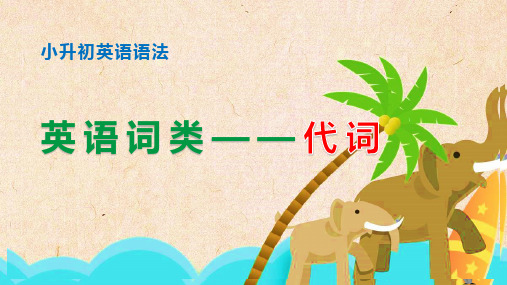
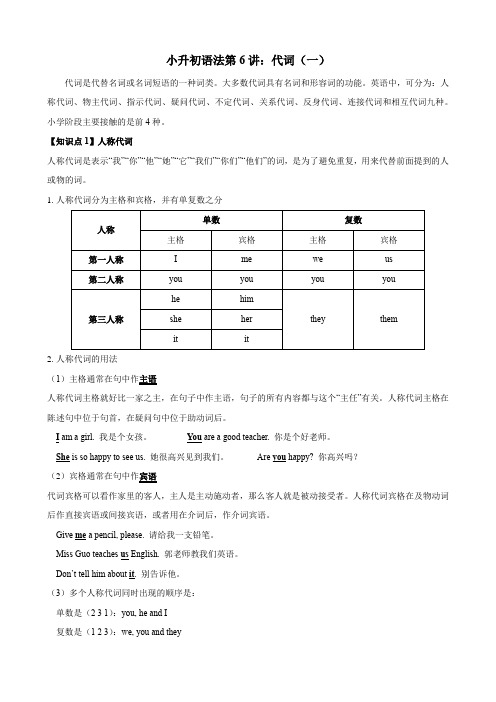
小升初语法第6讲:代词(一)代词是代替名词或名词短语的一种词类。
大多数代词具有名词和形容词的功能。
英语中,可分为:人称代词、物主代词、指示代词、疑问代词、不定代词、关系代词、反身代词、连接代词和相互代词九种。
小学阶段主要接触的是前4种。
【知识点1】人称代词人称代词是表示“我”“你”“他”“她”“它”“我们”“你们”“他们”的词,是为了避免重复,用来代替前面提到的人或物的词。
1.人称代词分为主格和宾格,并有单复数之分2.人称代词的用法(1)主格通常在句中作主语人称代词主格就好比一家之主,在句子中作主语,句子的所有内容都与这个“主任”有关。
人称代词主格在陈述句中位于句首,在疑问句中位于助动词后。
I am a girl. 我是个女孩。
You are a good teacher. 你是个好老师。
She is so happy to see us. 她很高兴见到我们。
Are you happy? 你高兴吗?(2)宾格通常在句中作宾语代词宾格可以看作家里的客人,主人是主动施动者,那么客人就是被动接受者。
人称代词宾格在及物动词后作直接宾语或间接宾语,或者用在介词后,作介词宾语。
Give me a pencil, please. 请给我一支铅笔。
Miss Guo teaches us English. 郭老师教我们英语。
Don’t tell him about it. 别告诉他。
(3)多个人称代词同时出现的顺序是:单数是(2 3 1):you, he and I复数是(1 2 3):we, you and they❊ 特别提示:✮几个人称代词若作为主语连用,一般情况下第一人称I放在最后。
He and I are both students. 他和我都是学生。
✮ it一般表示动物或者没有生命的物体。
但在下述几种情况下我们也常用it:(1)表示婴儿Look at the baby. It’s so cute. 看看孩子。
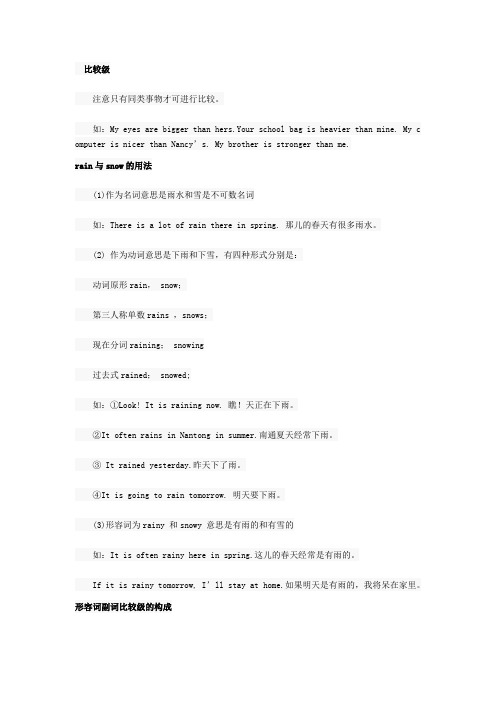
比较级注意只有同类事物才可进行比较。
如:My eyes are bigger than hers.Your school bag is heavier than mine. My c omputer is nicer than Nancy’s. My brother is stronger than me.rain与snow的用法(1)作为名词意思是雨水和雪是不可数名词如:There is a lot of rain there in spring. 那儿的春天有很多雨水。
(2) 作为动词意思是下雨和下雪,有四种形式分别是:动词原形rain, snow;第三人称单数rains ,snows;现在分词raining; snowing过去式rained; snowed;如:①Look! It is raining now. 瞧!天正在下雨。
②It often rains in Nantong in summer.南通夏天经常下雨。
③ It rained yesterday.昨天下了雨。
④It is going to rain tomorrow. 明天要下雨。
(3)形容词为rainy 和snowy 意思是有雨的和有雪的如:It is often rainy here in spring.这儿的春天经常是有雨的。
If it is rainy tomorrow, I’ll stay at home.如果明天是有雨的,我将呆在家里。
形容词副词比较级的构成规则的:(1)直接在形容词或副词后加er如;small—smaller;low—lower;(2)以e结尾的加r如:late—larer;(3)双写词尾加er如:big—bigger;thin—thinner;fat—fatter;(4)以辅音字母加y结尾的改y为i加er如:heavy—heavier;early—earlier;不规则的有:good,well—better(最高级为best);many,much---more(最高级为most);far---farther;规则动词过去式的构成(1)直接在动词后加ed如:clean—cleaned;milk—milked;play—played;(2)以e结尾的直接加d如:dance—danced;taste—tasted;(3)以辅音字母加y结尾的改y为i加ed如:study—studied;carry—carried;(4)双写词尾加ed如:stop—stopped;jog—jogged;不规则的有:am,is—was;are—were;do,does—did;have,has—had;go—went;meet—met;sit—sat;see—saw;get—got;tell—told;run—ran;come—came;stea l—stole;read—read;现在分词的构成(1)直接在动词后加ing如:sing—singing;ski—skiing;(2)双写词尾加ing如:swim—swimming;jog—jogging;run—running;(3)以不发音的e结尾的去e加ing如:ride—riding;dance—dancing;make—making;动词第三人称单数的构成(1)直接在动词后加s如:run—runs;dance—dances(2)以s,sh,ch,o结尾的加es如:do—does;go—goes;wash—washes;catch—catches(3)以辅音字母加y结尾的改y为i加es如:study—studies;carry—carries;名词复数构成的方法有规则的有:(1)直接在名词后加s如orange—oranges;photo—photos;(2)以x,s,sh,ch结尾的加es如:box—boxes;glass—glasses;waitress—waitresses;watch—watches;peach --peaches(3)以辅音字母加y结尾的改y为i加es如:study—studies;library—libraries;hobby—hobbies;family—families;(4)以f,fe结尾的改f,fe为v+es如:knife—knives;thief—thieves(注:以o 结尾的我们学过的只有mango加es,mango—mangoes其余加s,)不规则的有:man—men;woman—women;people—people;child—children时间介词季节前,月份前用介词in如:in summer;in March具体的哪一天如星期几,几月几日用介词on如:on Saturday; on the second of April; on Wednesday morning在几点钟前用介词at如: at a quarter to four;只在上下午晚上用in如:in the morning/ afternoon/ evening;但在夜间用at night。

小升初英语复习重点汇总小升初英语复习重点汇总学好初中的英语知识,可以为将来高中英语的学习打下结实的基础,减少学习负担。
下面是小编为大家整理的小升初英语复习重点,欢迎阅读,希望对大家有所帮助。
小升初英语复习重点1:主要不定代词的用法:(1)one的用法A. one作为代词可以指人,也可以指物。
B. one,ones (one的复数形式) 可用来代替前面出现过的少数名词,以避免重复。
C. one的前面可用this,that,the,which等词来修饰。
D. 常有a+形容词+one这一形式。
it和one的用法区别:it用来指特定的东西,而one则用于替代不特定的东西。
(2)some和any的用法区别A. some,any可与单、复数可数名词和不可数名词连用。
some 一般用于肯定句,any一般用于否定句,疑问句和条件句中。
B. some,any与—thing,—body,—one构成的合成词的用法与some,any一样。
C.在疑问句中,一般不用some,只有当问句表示一种邀请或者请求,或期待一个肯定的回答时才能用some。
D. some在否定句中表示半否定,any表示全否定。
E.some用于单数可数名词前,表示“某个”而不是“一些”。
(3)other,another的用法数种类单数复数泛指another=an otherother (boys)others特指the otherthe other (boys) the others 功能作主语、宾语、定语作定语作主语、宾语 A. another=anotherI want to have another two cakes.我想再吃两个蛋糕。
B.the other表示两个中的另一个,常与one连用。
常见形式是“one...the other...”。
C. other+复数名词=othersD. the other+复数名词=the others(4) a11、both的用法 both表示“两者都……”,而a11表示“三个或三个以上的人或物都……”。


小升初英语语法专项复习:代词人称代词【知识梳理】1. 人称代词包括:主格:I you he she it we you they宾格:me you him her it us you them2. 人称代词主格在句子中充当主语,宾格充当动词的宾语或介词的宾语,如:The children are playing games in the park. They are having a good time. (主语)Miss Black is our English teacher. We all like her. (动词宾语)Here are some flowers for her. (介词宾语)3. 人称代词的语序几个人称代词并列作主语时,它们的顺序是:单数形式(2,3,1)you, he and I复数形式(1,2,3)we, you and they【例题精讲】根据句意,从每题所给的A. B. C. D四个选项中,选择可以填入空白处的最佳答案。
1. 北京市2010年中考模拟试题My parents gave ______ a nice toy dog for my birthday.A. IB. meC. myD. mine答案与解析:答案B,give sb sth “给某人某物”,me作动词give的宾语。
2. I am an English teacher. ______ are students.A. YouB. YourC. YoursD. Me答案与解析:答案A,空白处应该是主语,要用人称代词主格,I和you都是主格,作主语。
3. The boys often ask ______ some questions.A. IB. youC. meD. mine答案与解析::答案C,动作对象就是宾语(即动作的承受者),me作动词ask的宾语。
4. 他父母经常给他买一些书。
His parents often buy some books for ______.答案与解析:答案him, him做介词for的宾语。
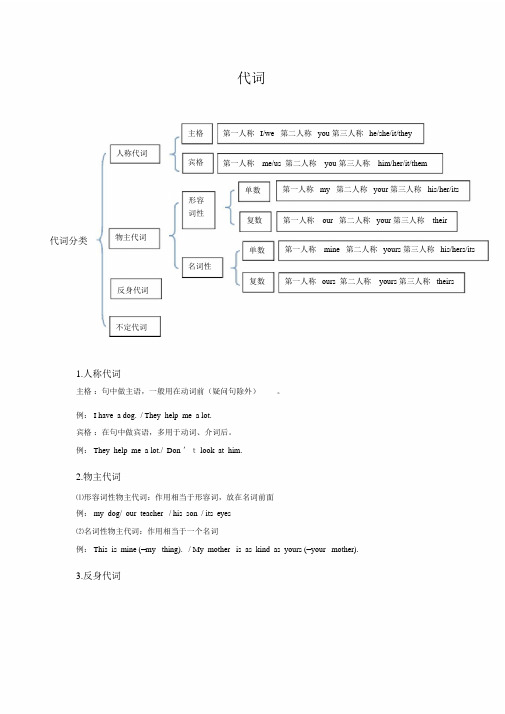



小升初英语主格人称代词知识点None is the ultimate state of nothingness, the complete absence of any and all existence, the total lack of any and all being It is the utter void, the pure emptiness, the absolute negation of reality and substance None is the complete deprivation of anything and everything, the sheer lack of any and all components, the total nonexistence of all that is conceivableAt the most fundamental level, none represents the complete absence of any and all forms, the total lack of any and all matter, the utter deficiency of any and all content It is the absolute negation of any and all entities, the complete nonpresence of any and all essences, the total nonreality of any and all existences None is the pure vacuum, the absolute emptiness, the complete lack of any and all substancesOn the most basic level, none signifies the total nonbeing of any and all beings, the complete nonexistence of any and all existents, the utter absence of any and all things It is the absolute lack of any and all presences, the sheer deficiency of any and all realities, the complete dearth of any and all components None represents the total negation of all that is imaginable, the utter nonsubstance of allthat is thinkable, the complete vacuum of all that is knowableAt the most elemental level, none denotes the absolute lack of anything whatsoever, the complete absence of everything imaginable, the total deficiency of all that is conceivable It is the utter insufficiency of all that is thinkable, the sheer depletion of all that is knowable, the complete dearth of all that is perceivable None signifies the absolute negation of all that is conceivable, the total nonbeing of all that is imaginable, the utter nonexistence of all that is thinkableOn the most fundamental plane, none represents the complete lack of any and all being, the utter absence of any and all existence, the total deficiency of any and all things It is the absolute insufficiency of any and all entities, the sheer depletion of any and all realities, the complete dearth of any and all substances None denotes the utter scarcity of any and all presences, the absolute negation of any and all components, the total nonbeing of any and all existentsAt the most basic level, none signifies the utter nonexistence of any and all beings, the complete nonpresence of any and all existences, the absolute nonreality of any and all things It is the sheer nonsubstance of any and all entities, the total vacuum of any and all realities, the complete void of any and all substances None represents the absolute nothingness of any and all presences, theutter lack of anything whatsoever, the total absence of everything imaginableOn the most elemental plane, none denotes the complete deficiency of all that is conceivable, the absolute insufficiency of all that is thinkable, the sheer depletion of all that is knowable It is the utter dearth of all that is perceivable, the complete scarcity of all that is conceivable, the total negation of all that is imaginable None signifies the absolute nonbeing of all that is thinkable, the utter nonexistence of all that is knowable, the sheer nonpresence of all that is perceivableAt the most fundamental level, none represents the complete nonreality of all that is conceivable, the absolute nonsubstance of all that is thinkable, the total vacuum of all that is knowable It is the utter void of all that is perceivable, the complete nothingness of all that is conceivable None denotes the absolute lack, the total absence, the complete deficiency, the utter insufficiency, the sheer depletion, the utter dearth, the absolute scarcity, the complete negation, the total nonbeing, the utter nonexistence, the absolute nonpresence, the complete nonreality, the sheer nonsubstance, the total vacuum, the utter void, the complete nothingness of any and all being, of any and all existence, of any and all things, of any and all entities, of any and all realities, of any and all substances, of any and all presences,of any and all components, of anything whatsoever, of everythingimaginable, of all that is conceivable, of all that is thinkable, of all that is knowable, of all that is perceivable。

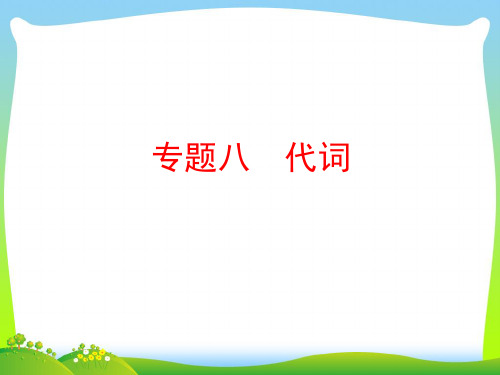

——————————新学期新成绩新目标新方向——————————第八讲代词一、千里之行始于词汇1.you /ju:, ju/ pron.你;你们2.I /ai/ pron.我3.she /ʃi:, ʃi/ pron.她4.he /hi:/ pron.他5.it /it/ pron.它6.they /ðei/pron.他(她、它)们7.we /wi:/ pron.我们8.me /mi:, mi/ pron.我9.him 他10.her 她 /ʌs, əs/ pron.我们12.them pron.(宾格)他(她,它)们13.my /mai/ pron.我的14.your /jɔ:/ pron.你的;你们的15.his /his/ pron.他的16.her /hə:, hə/ pron.她的17.their /ðɛə/ pron.他(她,它)们的18.our /'auə/ pron.我们的19.mine /main/ pron.我的20.hers /hə:z/ pron.她的21.its 它的22.ours 我们的23.theirs 他们的24.yours /jɔ:z/ pron.你的;你们的25.some /sʌm/ adj.一些;某些 pron.有些;26.who /hu:/ pron.谁;什么人27.this /ðis/pron.这;这个28.that /ðæt/pron.那;那个29.those /ðəuz/ pron.那些30.these /ði:z/adv.这些31.how /hau/ adv.怎样;如何32.what /wɔt/ pron.adj.什么33.What about...? …怎么样?…好吗?34.What color...? 什么颜色35.What kind of ...? 什么类型36.where /wɛə/ adv.在哪里;到哪里37.How about...? (提出建议)…怎么样?38.How much...? …多少钱39.How old...? …多大年纪?…几岁了?40.when /wen/ adv.什么时候41.Which哪一个42.Whose 谁的43.much /mʌtʃ/ pron.adv.许多;44.many45.little小的46.a little一点,少量47.few [fjuː] adj.很少的; n.少量48.a few49.many 许多50.either adv或者;也51.lot pron. 大量;许多52.quite a lot(of…) 许多53.anything(常用于否定句或疑问句)任何东西;任何事物54.any55.anyone ['eniwʌn] pron.任何人56.nothing(=not…anything) ['nʌθɪŋ] pron.没有什么 n.没有57.everyone ['evriwʌn] pron.每人;人人58.someone ['sʌmwʌn] pron.某人;有人59.lots of= a lot of61.other60.another代词:代替名词的一种词类。
第八讲代词一、千里之行始于词汇1.you /ju:, ju/ pron.你;你们2.I /ai/ pron.我3.she /ʃi:, ʃi/ pron.她4.he /hi:/ pron.他5.it /it/ pron.它6.they /ðei/pron.他(她、它)们7.we /wi:/ pron.我们8.me /mi:, mi/ pron.我9.him 他10.her 她 /ʌs, əs/ pron.我们12.them pron.(宾格)他(她,它)们13.my /mai/ pron.我的14.your /jɔ:/ pron.你的;你们的15.his /his/ pron.他的16.her /hə:, hə/ pron.她的17.their /ðɛə/ pron.他(她,它)们的18.our /'auə/ pron.我们的19.mine /main/ pron.我的20.hers /hə:z/ pron.她的21.its 它的22.ours 我们的23.theirs 他们的24.yours /jɔ:z/ pron.你的;你们的25.some /sʌm/ adj.一些;某些 pron.有些;26.who /hu:/ pron.谁;什么人27.this /ðis/pron.这;这个28.that /ðæt/pron.那;那个29.those /ðəuz/ pron.那些30.these /ði:z/adv.这些31.how /hau/ adv.怎样;如何32.what /wɔt/ pron.adj.什么33.What about...? …怎么样?…好吗?34.What color...? 什么颜色35.What kind of ...? 什么类型36.where /wɛə/ adv.在哪里;到哪里37.How about...? (提出建议)…怎么样?38.How much...? …多少钱39.How old...? …多大年纪?…几岁了?40.when /wen/ adv.什么时候41.Which哪一个42.Whose 谁的43.much /mʌtʃ/ pron.adv.许多;44.many45.little小的46.a little一点,少量47.few [fjuː] adj.很少的; n.少量48.a few49.many 许多50.either adv或者;也51.lot pron. 大量;许多52.quite a lot(of…) 许多53.anything(常用于否定句或疑问句)任何东西;任何事物54.any55.anyone ['eniwʌn] pron.任何人56.nothing(=not…anything) ['nʌθɪŋ] pron.没有什么 n.没有57.everyone ['evriwʌn] pron.每人;人人58.someone ['sʌmwʌn] pron.某人;有人59.lots of= a lot of60.another61.other代词:代替名词的一种词类。
Mary and Tom are good friends. Mary and Tom are in the same class. Mary and Tom's teacher often praises Mary and Tom for Mary and Tom's studies.1、人称代词2.物主代词。
表示所有关系的代词叫做物主代词。
物主代词可分为形容词性物主代词和名词性物主代词。
2、物主代词的用法:形容词性物主代词相当于形容词,用在名词前。
This is my book. Are these your pencils?名词性物主代词相当于名词,不能用于名词前。
Look at the two pencils. The red one is yours and the blue one is mine.He likes my pen. He doesn't like hers.名词性物主代词=形容词性物主代词+名词为避免重复使用名词,有时可用“名词性物主代词”来代替“形容词性物主代词+名词”的形式。
My bag is yellow, her bag is red, his bag is blue and your bag is pink.【口诀】有“名”则“形”,无“名”则“名”。
This is your ruler, it is not mine.这是你的尺子,不是我的。
这是他的书,你的在桌子上。
(他) doesn't have an eraser. __(我的)is in the bag. Give __(他)__(你的). book is here, is there.(his/her)这把绿色的尺子是她的。
The is .这些铅笔是鲍勃的。
These are .这个绿色的钢笔是你的吗? the green pen .注:物主代词不与a, an, this, that, these, those, some, any, several, no, each, every, such, another, which等词一起前置,修饰一个名词,而必须用双重所有格。
3、反身代词。
第一、二人称构成是由形容词性物主代词加“-self ”(复数加 -selves ) 构成。
第三人称反身代词是由人称代词宾格形式加 - self (复数加 - selves ) 构成。
myself yourself yourselves herself himself ourselves themselves itself oneself常考的反身代词Help yourself to....Enjoy oneself4、指示代词:用于指示上下文中出现的人或事物的代词。
“这个”“那个”“这些”“那些”。
this that these those1) This / That is...这/那个是......2) These / Those are...这/那些是......This is my friend Jane.这(位)是我的朋友简 That is my grandfather. 那(位)是我的祖父。
These are my brothers. 这些是我的兄弟。
Those are my parents. 那些是我的父母。
This is my friend. 复数 These are my friends. That is my brother. 复数 Those are my brothers.Practice 翻译❖这是我爸爸。
❖那是你朋友。
❖那是你姐姐。
❖那些是我妹妹。
❖这些是我的朋友们。
❖那些是他的兄弟们。
❖这是我的家庭。
❖那是我的爷爷。
❖这些是我的哥哥们。
❖那是我的妈妈。
❖这是她的奶奶。
❖那是他的儿子。
❖这是他的女儿。
❖这是我们的父母。
❖那是我的祖父母。
3)Is this/that...? 这/那是......吗?Yes, it is. / No, it isn't. 是的,这/那(它)是。
/ 不,这/那(它)不是。
△回答时,要用it来代替this和that。
不可回答Yes, this/that is. / No, this/that isn't. Is this your pencil ? Yes, it is. It's mine.No, it isn't. It's hers.Is that your schoolbag? Yes, it is. It's mine.No, it isn't. It's his.It's = It is isn't = is not4)Are these / those … ? Yes, they are. / No, they aren't.△回答时,要用they来代替these和those。
Practice5、疑问代词who /hu:/ pron.谁;什么人指人: who, whose指物: what既可指人又可指物: whichWhat询问姓名、电话号码、颜色、兴趣爱好、班级、年级等等。
What's your name?What's this in English?What's this?What are these?What do you do on weekends?What's your telephone number?What color is it?What Grade are you in?What Class are you in?What's your favorite color/season/fruit/vegetable/subject?What day is it today?=What's the day today?What can you do?What are you=What do you do?What would you like to eat/drink?What's the weather like today?What's your hobby?Who用于问人Who are you?Who is that?Who is she?Whose用于询问物品或者人的所属关系。
Whose computer is this?=Whose is this computer?Which询问哪一个?可以指人也可以指物,一般用于有一定选择范围的情况。
Which one is Lily?6、不定代词1) other, the other, another, others, the othersother, 其余的the other,两个中的另一个 I have two friends. One is from China, the other is from America.another, 三者以上的另一个 Would you like another cake?others, 其余中的一部分the others 其余的全部 There are five people in the classroom. One is a girl, the others are boys.I like English, others like maths.小练习①Those cakes look delicious. Could I have _________ one?A. otherB. the otherC. the othersD. Another②I have many such novels. I'll bring _________ tomorrow.A. otherB. the otherC. the othersD. Another③ Saying is one thing and doing is _________.A. other B. the other C. the others D. another④I have two cats. One is black, and ____ is white. A. another B. some C. other D. the other⑤ I don't like the apple. Can you give me ________ apple?A. otherB. othersC. anotherD. the other⑥Would you like_______ cup of tea?2) it, one, onesit,替代上文中提到的事,也可以指一个人。